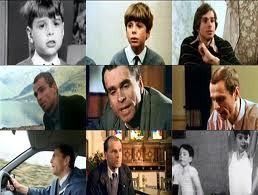
I’m not often excited by the announcement of a television programme, but this one is different. This one is the latest instalment of a brilliant documentary series that started way back in 1964 and has been broadcast only once every seven years.
It is now known as The Up Series, starting with Seven Up!, which introduced the 14 British children who would be filmed every seven years of their lives. The premise of the original programme was taken from the Jesuit saying: “Give me a child until he is seven and I will give you the man”, and the participants were chosen to represent the extremes of social class in Britain in the 1960s.
So, among others, we met cheeky chirpy Cockney lad Tony, who wanted to be a jockey; three excruciatingly posh upper-class boys from a prep school; and Neil, an irrepressibly cheerful little chap from working-class Liverpool who wanted to be an astronaut – or failing that, a bus driver.
The most recent episode, 49 Up, was perhaps the most poignant so far, with all the participants well into middle age, having endured their fair share of life’s ups and downs, no matter what background they came from.
Perhaps the most touching story of all is Neil’s. At seven he was full of life and hope, but by 21 he was homeless, contemplating suicide (see pictures above). He struggled with mental health issues and by 28 was living in Scotland; by 35 he was in the Shetland Islands, as if he was trying to move away from civilisation.
Viewers held their breath to see what might have become of him by 42 Up. Amazingly, he had turned his life around with the help of a fellow participant, idealist Bruce, and was a Liberal Democrat councillor in Hackney.
By the time 49 Up was made he’d become a councillor in Cumbria, but you could see in his eyes that he’s still a tortured soul. Now we’re waiting to find out what happened next in 56 Up, due to be broadcast in May.
The venerable film critic Roger Ebert has said the series is among his top 10 best films of all time and that they “penetrate to the central mystery of life”.
He said: “The films exploit the use of cinema as a time machine. I feel as if I know these subjects, and indeed I do know them better than many of the people I work with every day, because I know what they dreamed of at seven, their hopes at 14, the problems they faced in their early 20s, and their marriages, their jobs, their children, even their adulteries.”
Some of the participants have complained about the effect appearing in this series has had on their lives – many did not welcome the scrutiny as they got older, and some dropped out of the process altogether.
Growing up in public and having such a vivid scrapbook of your life to review every seven years can’t be easy, and one wonders how different their lives might have been had they not participated in the series.
But we should be thankful to them because they demonstrate the compelling power of telling one’s life story – and that there’s no such thing as an “ordinary” life. As Roger Ebert said, anyone watching these films goes through a similar process of self-examination.
I’m a year younger than the subjects of The Up Series so the narrative arc of their lives is particularly resonant for me. I find myself wondering what I would have said at seven, 14, 28, 35, 42 and 49… and how much my life has changed since I hit 50. Would the seven-year-old me have provided clues about how my life has panned out?
I urge you to watch 56 Up if you can. It’s bound to be one the most poignant and life-affirming TV events of the year.
Leave a Reply